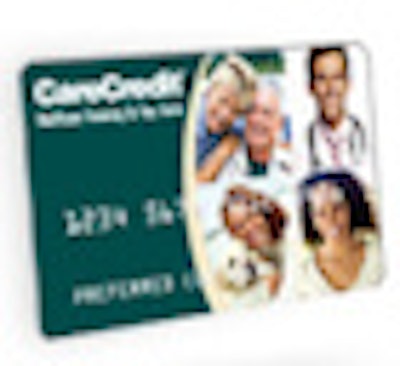
Six dental practices are among 10 healthcare providers being investigated by New York Attorney General (AG) Andrew Cuomo for alleged predatory lending practices involving GE Money's CareCredit service and other healthcare card providers.
The probe calls into question a financing option that has become increasingly popular during the current recession. Healthcare credit cards are similar to regular credit cards except they are designated for healthcare services and usually offer patients 12 months of interest-free credit.
An investigation by Cuomo's office found that some of the providers allegedly pressured patients into using CareCredit through "fast-talking sales pitches and deceit," according to a press release.
On August 4, Cuomo issued subpoenas to 10 healthcare providers that promote CareCredit, including these dental clinics:
- Allcare Dental Management, Buffalo, NY
- Aspen Dental Management, East Syracuse, NY
- East Syracuse Family Dental Arts, East Syracuse, NY
- S&Y Diamond Dental, Brooklyn, NY
- Sunshine Dental, Watertown, NY
- ToothSavers, New York City
Cuomo also subpoenaed three companies that manage CareCredit: Chase Health Advance, Visa Health Benefits, and Citibank Health Card.
The subpoenas seek marketing materials, applications, terms of credit, contracts and rebate agreements, policies and procedures, consumer complaints, and regulatory inquiries.
Hundreds of complaints
The probe was opened after Cuomo's office received hundreds of complaints from patients who said they were billed for procedures they didn't receive, were billed for work done improperly, were overbilled for services, or were signed up for CareCredit cards without their consent, the attorney general said. Seniors and low-income patients in particular were misled about the financing, causing them to be pushed into debt, Cuomo said.
— Irvin Lubis, D.M.D.
In one case, an Onondaga County woman was told by a dental practice she needed various procedures and to get them she would have to sign a CareCredit agreement. After only having one $400 procedure done, which she paid for, she received a bill for $2,600. Her attempts to get a refund were rejected by both the provider and CareCredit, according to the AG's office.
"Healthcare debt is the number one cause of individual bankruptcy, and this scheme is contributing to the economic burden being felt by consumers," Cuomo stated in a press release. "People are being tricked by misleading offers that have them paying for services they never received as well as interest charges they never knew about -- and they are ignored and given the runaround when they try to get their money back."
Cuomo's investigation also found that CareCredit charges the providers a fee for the right to offer the cards, then gives rebates for part of the fee based on the amount of money the providers generated through CareCredit sales. This alleged kickback arrangement creates an incentive for providers to push consumers to use CareCredit rather than other payment methods, the AG's office said.
Consumers reported that healthcare providers promised that the credit card had no interest, when it often carried retroactive interest of more than 25% if not paid in full during a promotional period, the AG's office alleges.
ADA response
|
Financing dos and don'ts Irvin Lubis, D.M.D., a former periodontist who now runs Dental Success Marketing, advises dentists against getting involved with private financing for their patients, especially since many people are now in trouble financially. "It's just not a good way to do business because you're assuming the risks of a bank in financing a patient's treatment," he said. Rocklin, CA, dentist Matthew Comfort, D.D.S., recounted his experiences when he allowed patients to make payments to him. "It failed miserably," he recalled. "They didn't pay their bills, and many with big balances went bankrupt." Dr. Lubis also advises doing phased treatment. "Put out the fires, do emergency care, and then do piecemeal care," he said. And for work that involves more than $500, he recommends getting a written agreement. Roger Levin, D.D.S., chairman and CEO of the Levin Group, recommends several options:
Dr. Levin also stressed the need to have patients understand whatever arrangements they agree to. The economic downturn has caused even affluent patients to delay work for themselves and their children, Dr. Lubis noted. "The rich are spending less, especially on cosmetically oriented treatments," he said. Even when dentists offer private financing, many patients are choosing to put off procedures, Dr. Lubis added. "If their children need work, some orthodontists have offered no initial payments, monthly payments, and no interest. But patients are still not able to commit to the work," he said. |
Meanwhile, Cuomo has asked the ADA and 13 other medical associations that endorse the CareCredit cards whether they were paid to do so. ADA President Ronald Tankersley, D.D.S., said the ADA shares the attorney general's concerns about credit financing practices.
"Financing can greatly benefit patients when it comes to paying for their dental treatment, provided that patients fully understand the terms of the financing program," Dr. Tankersley said in a statement. "Patients may not have dental insurance or readily available funds to pay for their care at the time of treatment. Some patients may wish to budget their treatment costs over time. In these types of instances, third-party financing can be a useful option for patients to structure payment plans to cover necessary or elective dental care."
The ADA continues to encourage dental office staff to advise patients to contact financing companies directly before signing an agreement if they do not fully understand how the program works, Dr. Tankersley added.
CareCredit spokesman Stephen White told DrBicuspid.com that the company will cooperate fully with the New York Attorney General's office. "We look forward to learning more about this matter and working with the Attorney General's office," he stated in an e-mail.
A good option
Despite the alleged issues in New York, many dentists and practice management experts who use or recommend CareCredit say it is a good option for patients who need help paying for their dental work. Matthew Comfort, D.D.S., a Rocklin, CA, dentist who has used CareCredit for four years, told DrBicuspid.com that his experience with the card has been good.
"I've had no problems except for a woman who complained that she was charged more than 20% interest on the full balance retroactively to when she got the card because she missed a payment," he said.
Roger Levin, D.D.S., chairman and CEO of the Levin Group practice management firm, told DrBicuspid.com he recommends CareCredit to dentists because "they continually do an outstanding job."
Dr. Comfort said his patients are welcome to use credit cards or debit cards but emphasized that he doesn't push any particular card. With CareCredit, he receives no rebates and pays about 3% interest on outstanding balances, and his CareCredit patients can avoid paying interest for up to two years if they get a minimum of $2,500 of work done and pay the minimum monthly payments, he said.
Irvin Lubis, D.M.D., a former periodontist who now runs Dental Success Marketing, said he occasionally hears that patients who don't make timely payments are charged interest retroactively on balances for the CareCredit cards. "Office managers should carefully explain terms of the agreement," he told DrBicuspid.com.
The interest-free plans are subsidized by the interest rate that providers pay to the banks issuing the cards, he added.
Dr. Lubis said Cuomo's investigation casts a negative light on the majority of ethical dentists. "It's very unfortunate and is kind of a black eye on dentistry and the good dentists who are trying to work with patients in today's difficult economy," he said.
Providers have urged cardholders to finance procedures even when they can pay in cash, Cuomo said. Providers are paid within two days of the charge, giving them even more incentive to push the cards, the AG said. But this is a common credit card policy, according to Dr. Lubis.
In January, California passed a new law regulating the way credit cards and other loan products are handled in dental offices. The law is designed to protect elderly and low-income patients or those who speak limited English from signing up for credit without understanding what they are doing. Dentists must give information in the patient's primary language, and costs must be refunded if dental services aren't provided within 15 days.
Copyright © 2010 DrBicuspid.com



















